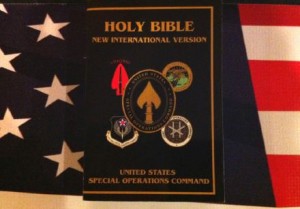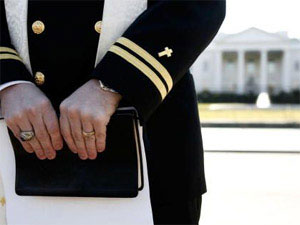 Total charitable contributions by individuals, foundations, bequests, and corporations reached $298.42 billion in 2011, with religious organizations receiving the largest share ÔÇô thirty-two percent ÔÇô of total estimated contributions. Holding religious organizations to the same filing standards as other charitable and educational institutions ensures that the almost $100 billion being donated to religious organizations is actually going to help those who need it.
Total charitable contributions by individuals, foundations, bequests, and corporations reached $298.42 billion in 2011, with religious organizations receiving the largest share ÔÇô thirty-two percent ÔÇô of total estimated contributions. Holding religious organizations to the same filing standards as other charitable and educational institutions ensures that the almost $100 billion being donated to religious organizations is actually going to help those who need it.
Yet churches are currently automatically tax-exempt and entitled to the benefits of 501(c)(3) status without applying for advance recognition from the IRS. All other organizations must fill out the 31-page Form 1023 to apply to receive recognition. Once the IRS grants a secular organization tax-exempt status pursuant to §501(c)(3), the organization must file a Form 990 annual return with the IRS. The IRS uses the information provided in the Form 990 to ensure that an organization granted tax-exempt status remains so qualified. But churches and their integrated auxiliaries areexempt from filing 990 returns.
Churches also receive practical immunity from IRS auditing based on procedures set forth in the Church Audit Procedures Act. CAPA requires that before the IRS may begin an inquiry into the tax status of any organization claiming to be a church, the IRS must satisfy certain prerequisites, including articulating a reasonable belief in the need for an investigation, providing special notice to the church, and having a high-level Treasury officialconduct the inquiry.
The Catholic Church and entities owned by the Church spent approximately $170 billion in 2010. Included in this amount is a percentage of the $3.3 billion spent on settlements over the past 15 years of cases where priests have been accused of child-molestation and rape.  And in July 2012 the former chief financial officer of the archdiocese of Philadelphia was convicted for embezzling more than $900,000 between 2005 and 2011.
The Church of Jesus Christ of Latter-day Saints donated $1.4 billion between 1985 and 2011, ┬ábut that figure only accounts for .9% of the LDS ChurchÔÇÖs annual revenue during that time, estimated around $156 billion. In comparison, the American Red Cross spends 92.1% of its revenue directly addressing the needs of those it intends to help. Although its annual revenue is approximately half of the LDS Church, the American Red Cross spent twice as much money on charity in one year than the LDS Church did in 26 years. Not only is the LDS Church not subject to the same regulations as other billion-dollar corporations, but the Church is also exempted from non-profits regulation and enforcement as a religious organization.
The combination of §508(c)(1)(A), §6033(a)(3)(A)(i), and §7611 ensures that churches receive substantial tax benefits while remaining insulated from public or government review. When select organizations are shielded from any investigation, it is impossible to know whether these organizations are using their funds for benevolent action. Religious privileges nonessential for accommodating free exercise should be removed from the tax code, including the initial 501(c)(3) application exemption for churches, the annual Form 990 filing exemption for churches, and the restrictions on IRS investigations of churches known as the Church Audit Procedures Act (CAPA). Closing the three tax loopholes would not only establish necessary accountability, it would also create significant revenue for the federal government. If only a quarter of the $100 billion donated to religious organizations per year were ineligible for deduction, that money could be subject to a gift tax of up to 35%, or as much as $8.75 billion in revenue. Property tax revenues regained from previously exempt churches that violate 501(c)(3) rules could be considerable. Revenues lost to the non-profit property tax exemption in 2009 were an estimated $17-$32 billion nationally.
POLICY RECOMMENDATION: A simpler and fairer tax code can be achieved by removing the following three provisions:
- §508(c)(1)(A) which awards churches 501(c)(3) status without application;
- §6033(a)(3)(A)(i), which removes the requirement to file annual IRS reports; and
- §7611, which shields churches from IRS investigation.
 A new Pew study shows that nearly a full third of the Earth’s 196 countries currently display religious symbols on their national flag. Christian symbols are the most used followed by those of the Islamic faith. Regional analysis of these countries as well as insight into the religious nature of several state flags in America, is also available.
A new Pew study shows that nearly a full third of the Earth’s 196 countries currently display religious symbols on their national flag. Christian symbols are the most used followed by those of the Islamic faith. Regional analysis of these countries as well as insight into the religious nature of several state flags in America, is also available.![]()
 In this Fox News ‘First on the Kelly File’ video clip featuring Megyn Kelly, see a spirited discussion between Kelly and Mikey Weinstein of the Military Religious Freedom Foundation over the proposed removal of the word ‘God’ from the Air Force Oath.
In this Fox News ‘First on the Kelly File’ video clip featuring Megyn Kelly, see a spirited discussion between Kelly and Mikey Weinstein of the Military Religious Freedom Foundation over the proposed removal of the word ‘God’ from the Air Force Oath. Congress has recently seen proposals that would permit religious organizations to endorse political candidates while receiving 501(c)(3) benefits. IRS rules prohibit partisan politicking by any organization ÔÇô religious or secular ÔÇô that receives tax exemptions under 501(c)(3). Churches, like secular non-profit organizations, have the option of forgoing tax-exempt status if they wish to endorse politicians, but taxpayer money in the form of tax exemptions for 501(c)(3) organizations cannot be used for partisan political activity. Even under current law, Alliance Defending Freedom has asked religious leaders to defy the prohibition on political endorsements on what it calls ÔÇ£Pulpit Freedom Sunday.ÔÇØ
Congress has recently seen proposals that would permit religious organizations to endorse political candidates while receiving 501(c)(3) benefits. IRS rules prohibit partisan politicking by any organization ÔÇô religious or secular ÔÇô that receives tax exemptions under 501(c)(3). Churches, like secular non-profit organizations, have the option of forgoing tax-exempt status if they wish to endorse politicians, but taxpayer money in the form of tax exemptions for 501(c)(3) organizations cannot be used for partisan political activity. Even under current law, Alliance Defending Freedom has asked religious leaders to defy the prohibition on political endorsements on what it calls ÔÇ£Pulpit Freedom Sunday.ÔÇØ Military culture problematically promotes religious belief. A Department of Defense public affairs officer recently stated that it is acceptable to talk about faith but not to push it on others. However, specific case studies, regulatory requirements, and even basic definition of terms are not publicly available. Congress and military leaders should oppose efforts under the guise of ÔÇÿreligious freedomÔÇÖ or ÔÇÿconscienceÔÇÖ to discriminate or gain special privilege for religion. Proselytism and ubiquitous prayer create a military culture that oppresses nontheists, especially in the absence of any outreach or services.
Military culture problematically promotes religious belief. A Department of Defense public affairs officer recently stated that it is acceptable to talk about faith but not to push it on others. However, specific case studies, regulatory requirements, and even basic definition of terms are not publicly available. Congress and military leaders should oppose efforts under the guise of ÔÇÿreligious freedomÔÇÖ or ÔÇÿconscienceÔÇÖ to discriminate or gain special privilege for religion. Proselytism and ubiquitous prayer create a military culture that oppresses nontheists, especially in the absence of any outreach or services. Command endorsement of religion is common throughout the military. Unit logos are printed on Bibles, Bibles are placed in government hotels as a matter of policy, unit mottos commonly have religious themes, and prayer is said at most official command activities and every evening on naval vessels. Eliminating command endorsement of religion provides unimpeded opportunity for personal expression of religion and even facilitation and funding opportunities for religious activities, facilities, and events so long as they are not mixed with official command functions.
Command endorsement of religion is common throughout the military. Unit logos are printed on Bibles, Bibles are placed in government hotels as a matter of policy, unit mottos commonly have religious themes, and prayer is said at most official command activities and every evening on naval vessels. Eliminating command endorsement of religion provides unimpeded opportunity for personal expression of religion and even facilitation and funding opportunities for religious activities, facilities, and events so long as they are not mixed with official command functions. Chaplains currently have training about the diversity of belief systems they will encounter in the military as well as their requirement to serve the wide diversity, from Wiccan to Muslim to Christian Science to Sikh. Chaplains have no such training for the non-theist perspective so they are ill-equipped to provide referrals, provide appropriate resources, or even to be effective in basic counseling services.
Chaplains currently have training about the diversity of belief systems they will encounter in the military as well as their requirement to serve the wide diversity, from Wiccan to Muslim to Christian Science to Sikh. Chaplains have no such training for the non-theist perspective so they are ill-equipped to provide referrals, provide appropriate resources, or even to be effective in basic counseling services. While our military is making substantial progress integrating gay, lesbian and female Americans into its ranks, it continues to discriminate against nontheists. The chaplaincy has never had any formal training in non-theistic beliefs and practices. They are thus unqualified to extend their services to nontheists.
While our military is making substantial progress integrating gay, lesbian and female Americans into its ranks, it continues to discriminate against nontheists. The chaplaincy has never had any formal training in non-theistic beliefs and practices. They are thus unqualified to extend their services to nontheists. One of the very first in-processing activities for all military personnel is to receive their ID tags. Young troops are asked, ÔÇ£What is your religious preference?ÔÇØ There are over 100 different specific, general, and administrative answers to that question, and military personnel enjoy the right to put their beliefs on their ID tags and official records. Humanists are denied even that basic right. They must choose ÔÇ£atheistÔÇØ or ÔÇ£no religious preferenceÔÇØ which are both terms that state what they donÔÇÖt believe, not what they do believe. Adding an option would be neither administratively cumbersome nor intrusive on other beliefs, but that one additional option would add affirmation that all beliefs are accommodated equally.
One of the very first in-processing activities for all military personnel is to receive their ID tags. Young troops are asked, ÔÇ£What is your religious preference?ÔÇØ There are over 100 different specific, general, and administrative answers to that question, and military personnel enjoy the right to put their beliefs on their ID tags and official records. Humanists are denied even that basic right. They must choose ÔÇ£atheistÔÇØ or ÔÇ£no religious preferenceÔÇØ which are both terms that state what they donÔÇÖt believe, not what they do believe. Adding an option would be neither administratively cumbersome nor intrusive on other beliefs, but that one additional option would add affirmation that all beliefs are accommodated equally.